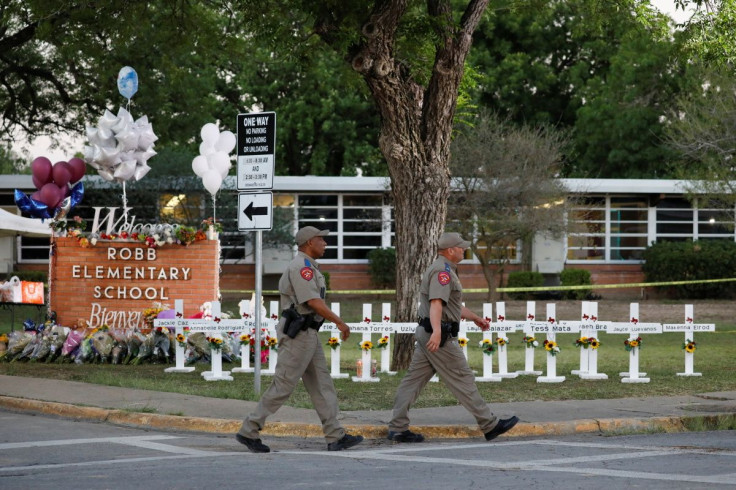Analysis-Police, Guns And Schools Protected From Lawsuits Over Texas Shooting

While public outrage grows over a school shooting in Uvalde, Texas that left 21 dead last week, the victims' relatives may never get their day in court against police, school authorities and gunmakers who enjoy special legal immunity that may protect them from being sued, according to attorneys.
As in past school shootings, families of the 19 students and two teachers will likely find that any lawsuits will run into legal challenges that do not exist for shootings in the workplace or other private property.
"I see Uvalde as an example of gaps in the law," said Erik Knockaert, a Texas lawyer who has represented victims of mass shootings. He is not representing Uvalde families.
The 18-year-old gunman, Salvador Ramos, used a gun manufactured by Daniel Defense of Georgia.
The difficulty arises from three kinds of legal protections: qualified immunity, which protects law enforcement officers from many lawsuits over their actions on the job; sovereign immunity, which shields governments from lawsuits; and a federal law shielding gunmakers from claims by shooting victims.
Qualified immunity could potentially bar lawsuits against Uvalde police even though the director of the Texas Department of Public Safety has acknowledged that officers made the "wrong decision" when they waited for backup before confronting the shooter, legal experts said.
Jamal Alsaffar, who represented victims of a 2017 Texas church shooting in Sutherland Springs, said overcoming qualified immunity will depend on what the police believed about the situation when they arrived and whether protocol required them to confront the shooter.
"The timeline is important in understanding if they can be held accountable in part for the tragedy," said Alsaffar, who is not representing Uvalde families.
The Uvalde police department did not immediately respond to a request for comment.
A federal judge dismissed a lawsuit in 2018 against Broward County and employees of its sheriff's office for failing to protect students of Marjory Stoneman Douglas High School in Parkland, Florida, where 17 people were killed earlier that year.
The judge ruled that the sheriff and county employees had no legal duty to protect students from the shooter, echoing rulings by the U.S. Supreme Court that said government only has a duty to protect people who are "in custody."
However, civil and criminal cases have been allowed to proceed against Scot Peterson, a former deputy sheriff who was a school resource officer at the high school and widely criticized for failing to confront the shooter. Those cases proceeded because Peterson had a "special relationship" with the students.
He is currently scheduled to face his criminal trial in September, which his attorney, Mark Eiglarsh, called "unprecedented and irresponsible" and said he feared it could lead to similar charges against law enforcement in the future.
Lawyers said there might be a case against the school district if it is determined if the shooter was easily able to enter the school because safety procedures weren't followed, but it will likely be a difficult case.
The Uvalde school district did not immediately respond to a request for comment.
Similar claims against the school district and town of Newtown, Connecticut by families of some of the 26 victims killed in 2012 at the Sandy Hook Elementary School was thrown out in 2018 on grounds of sovereign immunity.
Sandy Hook families were successful, however, in a case brought against gun manufacturer Remington, which made the Bushmaster assault-style weapon used by shooter Adam Lanza.
Gun manufacturers and dealers have near blanket immunity under a 2005 law known as the Protection of Lawful Commerce in Arms Act, or PLCAA, from civil lawsuits for crimes committed with their weapons.
There are exceptions if a company knowingly violated an applicable statute and Sandy Hook families alleged Remington violated Connecticut law related to the marketing of their product used in the shooting.
Jonathan Lowy, chief counsel for the Brady Campaign to Prevent Gun Violence, said a number of potentially viable claims should be considered against Daniel Defense. If the company's gun could be easily modified to fire automatically, PLCAA immunity would likely not apply, he said.
Daniel Defense declined to comment.
But others were less optimistic about following the Sandy Hook blueprint, which relied on a favorable interpretation of Connecticut law by that state's highest court.
"I would be surprised if the Texas Supreme Court has a strong appetite for expanding the exceptions to PLCAA immunity," said Tim Lytton, a Georgia State University College of Law professor who specializes in gun litigation.
Still, Lytton said lawsuits can lead to significant compensation even when the law is on the defendants' side.
In 2020, the Florida Supreme Court ruled the law caps at $300,000 liability for the school district in the Parkland shooting. Despite that, the next year the district agreed to pay $25 million to victims.
The U.S. Department of Justice also agreed to pay Parkland families $127 million early in the litigation over the government's failure to follow-up on tips about the shooter.
"Entering into a settlement and paying compensation," said Lytton, "that's a much easier response than coming up with changes in the law."
© Copyright Thomson Reuters 2024. All rights reserved.





















